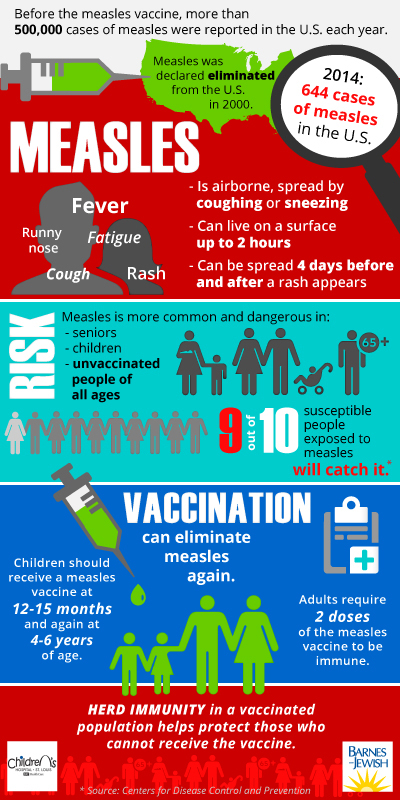Measles is back in the United States, and the population at greatest risk is our babies. Infants under one year are not old enough to have had their first MMR vaccine, so essentially all American infants are at risk for measles. Measles is highly contagious. Although most people who have measles recover uneventfully, it can cause permanent brain damage and death. What does this mean for parents? Can you take your baby to the grocery store? What about daycare? Should your baby be vaccinated early?
It’s time for a healthy reality check here.
Here are current stats on measles in the United States, from the CDC:
Additionally, in the first week of February, 2015 there have been at least five cases of measles traced to a suburban Illinois daycare center. These were all infants who were too young to be vaccinated.
Can I take my baby out in public?
In the grand scheme of things, the risk that your infant will contract measles is still very low. We all take risks every day with our infants, and it’s helpful to put these risks in perspective. Their risk of serious illness from influenza, for example, is still higher. Infants cannot get their first influenza vaccine until they are six months old. So, unless you are experiencing a measles outbreak in your immediate community, there is no reason to stop bringing your infant to the grocery store or other public places.
I would refrain from bringing an infant into a community of people who choose not to vaccinate. The majority of people who get measles are unvaccinated, and most outbreaks start in these communities.
How do I know if my daycare center is safe?
The largest community of unvaccinated people are infants in daycare centers. The best way to protect infants from measles is to be sure their care providers are all vaccinated. Ask your childcare providers if they are vaccinated. Ask what your childcare provider’s policy is on older children who are not vaccinated. I would be concerned about any child care center that includes both infants and a cluster of unvaccinated children and/or care providers. Don’t forget to ask grandparents if they are vaccinated, too!
How can parents and grandparents know if they need a booster shot?
Your baby’s grandparents may never have been vaccinated for the measles if they actually caught the measles. The measles vaccine first became available in the United States in 1963. Before then essentially everyone caught the measles. Most people who had the measles virus are still immune to measles and do not need to be vaccinated. If you are unsure of your measles vaccination status you can have a blood test done to determine if you are immune. Another option is to just get vaccinated without drawing blood tests. If you are unsure if you are immune to measles, it’s time to schedule a doctor’s visit.
Should my baby be vaccinated early?
The CDC recommends that infants who travel outside of the United States should have their first MMR vaccine early, at 6 months of age instead of 12 months. Given the current outbreak of measles in the United States, many parents of infants are wondering if their baby should be vaccinated before 12 months. At this time the CDC is not advising any change to the current vaccination schedule. Why not? I suspect because the overall risk of measles is still so low. But stay tuned– this recommendation may change if the number of measles cases in the United States continues to rise.
My colleague, Dr. Rachel Orscheln, infectious disease specialist, provides additional information for parents on measles in this segment on KTVI:






Comments